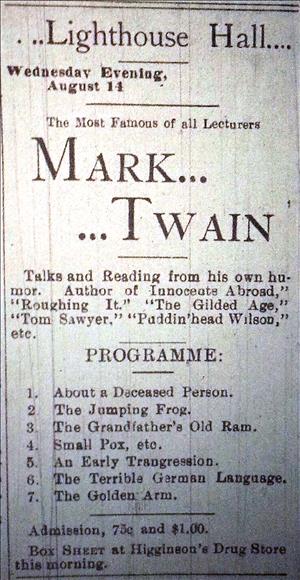On August 14, 1895, Mark Twain (1835-1910) speaks to a nearly full house at Lighthouse Hall in New Whatcom (which will become part of Bellingham in 1903). Though not normally known for its enthusiasm for humorous lectures, the New Whatcom crowd demands an encore when Twain finishes his 90-minute program.
Circling the Drain
In a way, Mark Twain -- the American writer whose given name was Samuel Clemens -- was circling the drain in the summer of 1895. He had slid deeply into debt, he was approaching his 60th birthday (which made him a fairly old man by 1895 standards), and various nagging physical ailments were making him feel his age. Even worse, as he confided to a friend that summer, he felt like he had nothing else to write. Tom Sawyer had been published 20 years earlier, and Huckleberry Finn had been out for a decade. But he needed to pay his debts, and that July he embarked on a yearlong, worldwide speaking tour that would ultimately rejuvenate him. New Whatcom was his last stop in the United States, and he arrived there directly from a successful gig in Seattle a night earlier.
Twain spoke that evening of August 14, 1895, at Lighthouse Hall, a theater on the top (third) floor of the Lighthouse Block on the southeast corner of Cornwall and Holly streets. The New Whatcom Daily Reveille reported that there were few empty seats in the theater, which seated more than 700. A copy of the program survives today in an advertisement published in the newspaper on the day of the lecture. It shows that Twain planned to cover at least seven subjects, ranging from possibly sober-sounding topics such as "About a Deceased Person" to something perhaps more colorful about "The Terrible German Language" (advertisement).
Twain's voice was hoarse and scratchy due to both a cold and smoke drifting through the air from nearby forest fires, but he gamely appeared on the stage at the appointed hour. After a slow start he warmed to the performance. Said the Daily Reveille:
"[T]he telling of the tales demonstrates that a good actor was lost when Mark Twain took to literature -- not a comedian or a tragedian, but a versatile actor, with as much pathetic force as laugh producing power … he probably never told his stories more effectively ..." ("Mark Twain's Lecture").
The article further described Twain as "rather small and slight, with a shock of grey hair, and a somewhat fierce moustache. His features are aquiline and severe rather than jolly, and he is as solemn as an owl when making the funniest points" ("Mark Twain's Lecture").
Scrambling for Shots
Audience members sat raptly through the program, "apparently without moving, except to laugh" ("Mark Twain's Lecture"), and they successfully called for an encore when the lecture ended. By this time Twain was feeling better and was ready for a post-lecture cigar and a drink. The cigar wasn't a problem, but the drink was. He was staying at the Fairhaven Hotel, managed by teetotaler Charles X. Larrabee (1843-1914), who had pointedly removed the hotel's bar five years earlier when the hotel had first opened. Twain's hosts were unpleasantly surprised to learn that no alternative drinking arrangements had been made for their guest, and they quickly arranged for a post-lecture party at the private Cascade Club, conveniently located in the Mason Block building (now Sycamore Square) across the street from the hotel. Hot toddies -- with a generous shot of whiskey -- were served all around to a delighted crowd of prominent local citizens who came to meet the famous author.
Twain soon left for Vancouver, British Columbia, his last North American stop, and then continued his trip by heading west across the Pacific Ocean into what turned out to be a fascinating world tour, and one that restored his creativity. The tour resulted not only in Twain's book about his adventure, Following the Equator, but also a second, much more recent, book about the trip -- Chasing the Last Laugh, written by Richard Zacks and published in 2016 to positive reviews.

